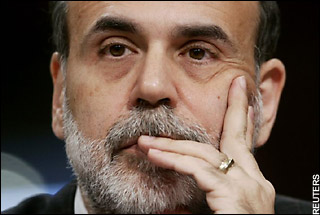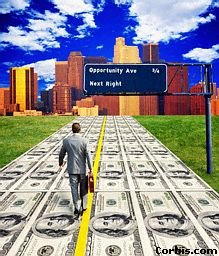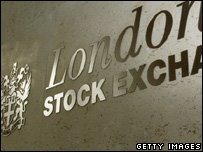Name::Trade Monkey
From::Middlebury, Connecticut, United States
Email Me!
View my profile
Can Managed Alpha Returns be Replicated?
Not With a Bang But a Whimper
The Trader is Dead, Long Live the Trader!
Want to be a Trade Monkey??
Fed Chief Wary of Regulating Hedge Funds
Lack of Posting
Headline of the Day
Power Law in FX Trading
How Not to Respond to High Gas Prices
VC Firms Bet on Clean Energy Deals
February 2006
March 2006
April 2006
May 2006
June 2006
Atlas Shrugs
Belmont Club
Cato Institute
Foreign Dispatches
Instapundit
Kim Du Toit
MIT OpenCourseware
Oxblog
Protein Wisdom
Samizdata
Templates By Caz
TCS Daily
Truth on the Market
Volokh Conspiracy
**View my Wish List**
Template By Caz
Powered by: Blogger
Wednesday, June 21, 2006
Can Managed Alpha Returns be Replicated?The dependency between two random variables is perfectly characterized by their joint distribution. One can nonetheless study the marginal distributions separately from the dependency structure by means of a statistical tool: copulas. This copula function contains the whole information about the variables' dependency structure.
Here's a thought; given the nature of copulas, could managed alpha be replicated by asset catagory? - picture a model that replicates, say...managed commodity returns.
Thoughts..?
 As you may be aware, I've blogged before about what I consider to be the inevitable restructuring of the alternative investment community. This restructuring is inevitable as excessive profits are not sustainable in an environment with relatively low barriers to entry - those who have ever worked at a hedge fund know exactly what I'm talking about. What is less certain is how this shakeup will occur.
As you may be aware, I've blogged before about what I consider to be the inevitable restructuring of the alternative investment community. This restructuring is inevitable as excessive profits are not sustainable in an environment with relatively low barriers to entry - those who have ever worked at a hedge fund know exactly what I'm talking about. What is less certain is how this shakeup will occur.I see three possible scenerios: 1) a crash caused by fund managers taking on extraordinary risk in order to cull the returns demanded by their clients - other factors would be at play as well. 2) textbook consolidation led by commercial banks, increased economies of scale and the subsequent lowering of fees. 3) a soft landing caused by a flight of clients fed up with high fees and average to below average returns.
Consider the following from the Financial Times:
Hedge fund managers are increasingly refusing to make risky investments for fear of losing customers and their sky-high fees, according to GAM, the world's biggest hedge fund firm. GAM, a fund of hedge funds specialist based in Zurich, said it was hard to find managers prepared to take the levels of risk needed to produce the high returns wealthy investors demanded.
David Solo, chief executive of GAM, which manages $55bn for private clients including $23bn in hedge funds, said the change in managers' risk appetite stemmed from their success in raising money from pension funds, endowments, insurance companies and other institutional investors.
With typical management fees of 2 per cent a year on large amounts of assets, there was more incentive to retain assets through cautious management than to seek additional performance fees from outsized returns.
The sector's profile has changed as institutions have poured money in and driven worldwide hedge fund assets to more than $1,000bn. Institutional investors such as pension funds have demanded that hedge funds in which they invest reduce their risk levels.
With mature hedge funds taking a conservative approach, GAM has been forced to invest in start-up hedge funds, typically staffed by former investment bankers who are prepared to take big risks until their fund reaches critical mass.
Hedge fund performance had also been hit by the weight of money coming into the industry, which had led to "overcrowding" in many strategies, he said.
Interestingly, the article says that mangers are, "refusing to make risky investments for fear of losing customers and their sky-high fees." - this is the crux of their problem. What kind of returns can a hedge fund produce by taking less risk? Put another way, will clients pay an alpha premium for beta returns? I don't think they will.

Just finished a great research report from IBM Business Consulting Services regarding what they called a "Financial markets renaissance." I think their assessment is spot on in many regards. Of particular note, is the role risk will play in defining the financial institutions of the future.
They argue that firms have long benefited from the edge provided by proprietary information access and market insight, but these advantages will come under significant pressure over the next decade as two inexorable trends accelerate: transparency and speed. As these two forces approach their limits – transparency can’t exceed the point at which everyone knows everything, and speed can’t move beyond the instantaneous – many of today’s profit engines will stall, while new value engines will begin firing on all cylinders.
In the not-too-distant-future, firms must be able to succeed in an environment where analysis, not knowledge, is the value creator, and where it’s not seconds that count, but milliseconds. Power will shift from the traders who have benefited from merely facilitating transactions to the buyers and sellers that take positions on either end of the trade, and the way that firms create value will likely experience a renaissance as transformational as anything the industry has ever witnessed.
The fundamental task for firms going forward will be to develop a clear perspective on risk. Value will be created in two ways: by effectively assuming and managing risk, or by mitigating risk, either by taking it out of the overall system, or by reducing it for their clients. Today, we characterize industry segments in terms of buy side, sell side and processors out of convenience. However, as value bifurcates on the risk dimension, this terminology may eventually become irrelevant.
Saturday, May 20, 2006
Want to be a Trade Monkey??Want to build a killer resume? Attract scores of hot members of the opposite sex? Maybe you just want to become a household name on Wall Street? If so, have you considered blogging?
Group-blogs are the way of the future. To ensure that Trade Monkey stays on the cutting-edge of 'content provision', I'm looking for a few good bloggers to join the Trade Monkey team.
All you need are a strong knowledge and passion for financial market/economics, and a couple spare hours a week. (I'm also considering expanding the spectrum of topics covered on Trade Monkey - so if politics, technology, or even something else is your bag, that might work too.) I'm open to ideas.
If you’re interested, drop me an Email.
 I came across this article (in of all places the Rocky Mountain News) regarding the new fed chief’s position on the regulation of hedge funds.
I came across this article (in of all places the Rocky Mountain News) regarding the new fed chief’s position on the regulation of hedge funds.Federal Reserve Chairman Ben S. Bernanke, who pledged to continue the policies of his predecessor, is sticking close to Alan Greenspan's opposition to regulation of hedge funds. Bernanke on Tuesday told a hedge-fund conference hosted by the Atlanta Fed that he's skeptical about proposals such as a database of fund holdings that would let authorities monitor risk in the broader financial system. Instead, firms that deal with hedge funds are best equipped to do the job because they have the "best incentives."
The Bloomberg reporters, Craig Torres and Scott Lanman, go on to further note:
His comments may not be the last word on the $1.2 trillion industry because the Fed doesn't have direct jurisdiction over financial markets. That's the responsibility of the Securities and Exchange Commission, whose former chairman, William Donaldson, clashed with Greenspan over a rule to require hedge funds to register with the agency.
I know, not exactly ground-breaking news, but it does reveal the fed chief's position on overall regulation.
Being the SEC has regulatory authority over the hedge fund industry, their historic position of "if it's not broke don’t fix it" will prevail - that is until the next hedge fund scandal causes a political clamor. Then, opportunistic politicians and various other demagogues will bend the SEC to their will and force hedge funds to a level of greater accountability. But I think it will take a financial catastrophe, on the scale of a LTCM, to motivate the Washington and the SEC (wary from the troubles of Sarbanes- Oxley) to increase regulation.
Two other points to consider: 1) would greater regulation of the industry attract even more capital to hedge funds? After all, more traditional asset managers, especially pension funds, would be more willing to have hedge funds manage money on their behalf if the industry had a higher level of transparency. 2) If the industry becomes more regulated, would smaller investors still be shut out?
The potential flood of new money into hedge funds would more than make up for the increased costs of compliance associated with any new regulatory initiative. However, this flood of money would pose an even greater challenge to hedge funds.
I apologize for the lack of posting lately, but I've been extremely busy; job interviews standardized testing, etc. Now that things have settled down, posting should get back to normal.
Al Gore Edition:
New Storm on Jupiter Hints at Climate Change.
I think they're taking this global warming thing way too far!
Thursday, May 04, 2006
Power Law in FX TradingSome interesting FX numbers at ALEA
The largest bank has nearly 20% market shareThe top 3 banks have a combined 40% market shareThe top 10 banks have 63% market shareThe top 20 banks have 83% market shareThe top bank [deutsche bank] has more market share than all the banks ranked 16th to 6336 put together.
More at Euromoney.
Thursday, April 27, 2006
How Not to Respond to High Gas Prices
Here is an excelent analysis, from Greg Mankiw's blog, of the bipartisan efforts to respond to the high gas prices:
Reuters reports:
Senate Republicans unveiled a proposal on Thursday to soften the blow of rapidly rising gasoline prices by giving taxpayers a $100 check and suspending a retail fuel tax....The proposal was similar to a Democratic measure first proposed by Senate Minority Leader Harry Reid of Nevada.
One might be tempted to applaud this sudden rush of bipartisanship. But let's first consider the economics of the proposal. I can see four drawbacks.
1. The economy is at or near full employment, and the Fed is raising interest rates to prevent the economy from overheating. Any stimulus to consumer spending would likely cause the Fed to increase interest rates to higher levels than it otherwise would have. The end result would be more consumption and less investment.
2. A lump-sum tax rebate has no supply-side incentive effects. Indeed, the history of such proposals is that the payments often phase-out as income rises. If so, this would be an increase in the effective marginal tax rate, which has adverse supply-side effects.
3. The federal budget is already on an unsustainable path. From the standpoint of the government budget constraint, this is a step in the wrong direction.
4. If gasoline taxes are suspended whenever prices go up, then consumers are partly insulated from price increases, making the effective demand curve for oil products less elastic. To the extent that prices are set by a supplier with market power (OPEC), a less elastic demand curve means higher prices.
Fortunately, the Senate proposal is a bit better than it might at first appear because:
To pay for the lost revenues, [Senator] Thune said, the legislation "would suspend a number of tax credits and royalty waivers received by oil corporations."
I don't know enough of the details to say whether these "tax credit and royalty waivers" should be suspended. But it seems that these policies should be judged on their own merits. The evaluation of these provisions need not be coupled with a lump-sum tax rebate and lower gasoline taxes, which are hard to defend on economic grounds.
Minus the "tax credit and royalty waivers" much of the mechanisms being discussed in Washington- such as excess profit taxes- have been tried in the 70's. If memory serves me correctly, the result was an further reduction of refinery capacity that only exaspirated the problem.
Wednesday, April 26, 2006
VC Firms Bet on Clean Energy Deals Good news...fuel prices have skyrocketed!
Good news...fuel prices have skyrocketed!While politicians fetter over what form of market manipulation is the best tool in lowering fuel prices, the private sector is already moving fast towards a long-term resolution.
From CNNMoney.com, via Finance Professor:
"Venture capital investors are flocking to clean energy technologies, a market expected to grow to $167 billion worldwide in the next decade, but some in the sector worry about too much money chasing too few deals.
Venture capitalists have been pumping increasing amounts of money into so-called clean energy technologies, ranging from solar power to alternative fuels and battery solutions. Venture capital funds invested $917 million in U.S.-based firms in the sector last year, up 22 percent from the previous year, according to Nth Power, a venture capital fund that focuses on energy technologies."
This month's Business 2.0 (sorry, can't find the link) has a great article on Silicon Valley start-ups that are poised to revolutionize the auto industry through the developement of electric engine technology. The end result of which will probably be an early buyout and technological integration from Detriot.
I expect rapid advancement in energy technology to come very soon rather than later. Of course expect much noise from Washington in the interim.
Tuesday, April 25, 2006
Alternative-Fuel-O-Rama:Popular Mechanics crunches the numbers on various alt-energy mechanisms.
Monday, April 24, 2006
Regulatory Arbitrage in Exchanges I posted about comments made by former Fed Chairman, Alan Greenspan regarding his "alarm" at the negative impact Sarbanes-Oxley have had on the US capital markets. Here is another take on the same subject from the Economist:
I posted about comments made by former Fed Chairman, Alan Greenspan regarding his "alarm" at the negative impact Sarbanes-Oxley have had on the US capital markets. Here is another take on the same subject from the Economist: ...the Intercontinental Exchange (ICE), a fast-growing, all-electronic operation based in Atlanta, which earlier this year began to compete against the tradition-bound New York Mercantile Exchange (NYMEX) in oil futures. [Charles Schumer, a Democratic senator from New York] is agitated about a perceived advantage for ICE that has broader implications for financial markets: the use of regulatory arbitrage. This is the idea that an exchange may operate in one jurisdiction rather than another so as to gain commercial advantage from more favourable regulation.
This strikes Mr Schumer as wrong, especially now that ICE has closed its trading floor in London and started to offer a contract in West Texas Intermediate crude oil, thus competing directly with NYMEX. James Newsome, president of NYMEX, says one regulatory difference that worries him is that ICE places no limit on the size of outstanding positions, while his exchange is subject to position limits under the CFTC. The New York exchange has responded by unveiling plans this month to list its energy contracts on the electronic trading platform of the Chicago Mercantile Exchange, in a deal intended to blunt ICE's technological edge.
ICE provides one example of how regulatory differences increasingly matter to exchanges. For another, take the (now suspended) bid by America's NASDAQ for the London Stock Exchange (LSE). The LSE has had success in attracting listings by overseas firms, often at NASDAQ's expense, in part owing to American laws such as the USA PATRIOT and Sarbanes-Oxley acts. Greater financial disclosure and the obligation for bosses to take responsibility for accurate reporting are two examples of rules that seem onerous to many...
At a time when hedge funds and other active investors are eager to move their money around the world and technology allows it to happen faster, regulators remain one of the last barriers to seamless global capital flows. Exchanges, meanwhile, are consolidating and accelerating their shift from floor to electronic trading, leaving them less tied to particular locations. “Exchanges aren't geographic concepts any more, they're legal concepts,” says Benn Steil, an exchange expert at the Council on Foreign Relations in New York.
What I found especially disturbing about this article was the reference to position limits as a competition dynamic. The implication is that, in an era of increased federal regulations, exchanges and exchange regulating bodies are feeling pressured into weakening the bulwarks of financial stability. As I see it, this, coupled with an alternative investment community that is constantly pushing the envelope in a quest for alpha, plus highly volatile markets for derivatives, is a very dangerous mix.